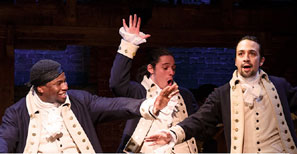
The new off-Broadway musical Hamilton is pure genius. Don’t take my word for it: the show about Alexander Hamilton—George Washington’s aide-de-camp during the American Revolution, primary author of the Federalist Papers, and the nation’s first Treasury secretary—is becoming a cultural phenomenon. The show is still in previews and doesn’t open until February 17, but it has already extended its run three times and will play through May 3 at New York’s Public Theater. According to the New York Post, producers are “dueling” over who gets to bring the show to Broadway. The Wall Street Journal notes that tickets are going for $650 on StubHub. Andrew Lloyd Webber tweeted that Hamilton “raises & changes the bar for musicals.” The New Yorker weighed in with an 8,000-word piece on the show and its creator, Lin-Manuel Miranda.
Miranda, who plays Hamilton in the show, wrote In the Heights, which won the 2008 Tony for best Broadway musical. He got the idea for a musical about Hamilton several years ago, when he read Ron Chernow’s 2004 biography. Chernow, who served as a consultant on the show and is cited near the top of the Playbill credits, should be proud. Miranda tells Hamilton’s story in an intelligent and historically accurate way, while also making the show enormously entertaining. It takes some doing to set Washington’s Farewell Address (which Hamilton helped write) to music and make it work.
New York–born, of Puerto Rican descent, Miranda sees Hamilton—an orphaned immigrant striver battling to prove himself—as a quintessential New Yorker. He went to university, joined the army, and practiced law in New York. His last home stands in Harlem; his grave lies at the foot of Wall Street, across from the Bank of New York, which he founded. The newspaper he started, the New York Post, still makes waves.
As Miranda explains, Hamilton was also contemporary, in his way. His tumultuous life, from his love of the ladies (Martha Washington once named an amorous cat “Hamilton”) to his verbal and nonverbal duels, reminds Miranda of “the stories of Tupac and Biggie.” The show’s first song, “Alexander Hamilton” (Miranda performed an early version at the White House in 2009), summarizes Hamilton’s chaotic childhood, which Miranda says “embodies hip-hop.”
In Miranda’s hands, Hamilton’s story is a crowd pleaser. The audience howls with laughter each time the foppish King George comes on stage, crooning to his loyal subjects. After spending most of the American Revolution in France, Thomas Jefferson struts onto the scene at the start of Act 2, singing “What’d I Miss?” At several pivotal moments in American history, Washington emcees a Hamilton vs. Jefferson rap duel, always coming down on Hamilton’s side.
Most of the Hamilton cast is nonwhite. Black actors portray Washington, Madison, Jefferson, and Burr. As the director’s notes in Playbill state, the cast is “as diverse as the city we love, is claiming the American Revolution as their revolution, and the ideals of freedom that founded this country as their own, still-unfinished dreams.”
Aaron Burr plays a major role in the show, as does Hamilton’s wife, Eliza. Both help make Hamilton’s saga a human one. Miranda spotlights how often Hamilton and Burr’s lives intersected before that fateful morning in Weehawken. We see Eliza’s pain when her husband wrote a public pamphlet detailing his affair with another woman—to prove that the hush money that he offered was not from public coffers—and how devastated she and Alexander were when their eldest son died in a duel defending his father’s honor.
Hamilton the musical is largely focused on the story of Hamilton the man. My only wish? I would have liked more about Hamilton’s legacy. If not for Hamilton charting its early course, American history might have been quite different. As Chernow writes, Hamilton was “the messenger from a future that we now inhabit. We have left behind the rosy agrarian rhetoric and slaveholding reality of Jeffersonian democracy and reside in the bustling world of trade, industry, stock markets, and banks that Hamilton envisioned.” Today, groups across the political spectrum claim Hamilton as their own. Tea Partiers like him because he defended the Constitution in the Federalist Papers. Wall Street conservatives like him because he is the architect of American capitalism. Liberals like him because he believed in a strong federal government. The Manhattan Institute holds an annual Hamilton Award Dinner, and the Brookings Institution has a Hamilton Project. And some just like the “hunky” way he looks on the redesigned ten-dollar bill.
There’s much to like about Hamilton. He understood that effective yet limited government, along with a well-functioning financial system, would nurture the entrepreneurialism that is America’s genius. He recognized the importance of innovation, and helped establish Paterson, New Jersey, as a model manufacturing town (with private funds). While many Founders were slaveholders, Hamilton was a staunch abolitionist. An immigrant himself, he understood the economic dynamism that immigration can foster. Education transformed Hamilton’s life, and he helped to found Hamilton College in upstate New York.
Hamilton runs three hours, with an intermission; the producers are looking to shorten it, someone involved with the show told me. They shouldn’t cut a word. With any luck, the show will come to Broadway soon, and every high school student in New York will get a chance to see it. What Lin-Manuel Miranda has created could introduce a new generation of young people to the Founders. Especially the coolest one.



